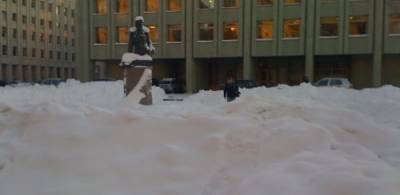
A brief introduction
Each archive is somewhat, and more often drastically, different from all others. This is why we provide separate detailed information on individual archives in this guide, but there are still many characteristics which they have in common. First and foremost, you should be aware that most Russian archives are closed for the whole of August, and many will close before the end of July and will not necessarily open right at the beginning of September. Calling ahead and checking the relevant archive website is a must to avoid wasting your research time. In Ukraine, archives are more likely to be open in August, but again, it's always best to check in advance.
Rather ironically, the first thing most archives have in common is a complete ignorance of each other and their respective rules. So, even though numerous Russian archives operate under the ultimate authority of Rosarkhiv, they often have very different rules concerning the use of, for example, laptops in the reading rooms. The archivists are usually completely unaware that there is any other set of rules outside of their own archive. This tends to mean that you will have to learn by error, while the archivists of a given archive will enjoy being amazed (and vocal) in response to your apparent ignorance of how things are done. This is part of the adventure and it's best to enjoy it all with a wry smile.
- Registering
-
To register to use an archive, you generally need to have an introductory letter from your institution with you. This should be on headed paper, with as many crests as possible. This should be written in Russian and state your name, with what institution you are affiliated, what you are working towards (e.g. a PhD), and the topic of your research (about which more later). This should be signed by your supervisor or head of department. If you can, have the letter stamped with an institutional rubber stamp; this is normal procedure for all official letters, but as a foreigner it usually isn't essential. You should take your passport with you on your first visit, which will be checked alongside your letter. You will then be required to fill in a questionnaire, which will be in Russian or the relevant local language. This will usually ask for the information already covered in your letter, but repetition is the heart of bureaucracy - acclimatise yourself now! If you wish to bring a laptop with you, then you may need to tell the archivists this; it may, inevitably, require an additional stamp on your pass. You will then receive a propusk (pass); depending on the archive this may be given to you immediately or on a future visit. Once you have a propusk you need to show this on entry each time you visit the archive. It's always advisable to have your passport with you, too, as the guards who work in archives can often change and some are more stringent than others.
When describing the topic of your research (or tema), it's very important that you keep your description as broad and generic as possible. This is because some archives (though not many) may refuse you material if the archivists think that, in their opinion, the material you have ordered does not fit your subject. Explaining the fine nuance of your research is unlikely to be pleasant or productive at this point. Furthermore, in post-Soviet academia there remains a strong tendency towards narrative, descriptive history. This can mean that archivists will not understand your tema very well if you provide them with a title involving unfamiliar concepts or language. In general, archivists will be very helpful to you if you ask for particular kinds of material after your initial registration, but for the purpose of filling in forms, it definitely saves an awful lot of headaches to write a very generic entry under tema: e.g. 'The Russian peasantry in the First World War' could cover an enormous number of sins. I mean, research topics.
- Life in the Archives
-
In the reading room of archives you are not permitted to wear 'outer' clothes. You will be expected to place your coat and bag in a cloakroom, usually located at the entrance to the archive. It can often be troublesome to get to your things without exiting the archive again, so it's best to make sure you take everything you need with you for the day when you first arrive.
Each archive will have different rules regarding the use of power sockets for laptops. Likewise, the use of cameras is likely to be prohibited, but there are often fees, which can be paid to have particular documents copied for you. In smaller, local archives, you may be able to strike a deal with the archivists to allow you to photograph to your heart's content, but, as with all things, this varies from archive to archive. Mobile phones are not allowed in the reading room, but you could be forgiven for thinking otherwise as most Russians have yet to discover the 'silent' function on their phones… or the 'quiet' setting on their voices.
Many archives have a canteen (stolovaia - stress on the second 'o') where staff and researchers can buy lunch, tea and coffee. These are usually cheaper than nearby cafes (if there are any), and can offer a great opportunity to speak to your counterparts and to archivists in a more relaxed setting. The food is usually fairly basic but can be very tasty; there are many opinions, but the editors of this guide think that the GARF and Lenin Library stolovaias come out on top, aided in no small measure by the wonderful friendliness of the women who run them.
- Ordering Material
-
When searching for and ordering material (see sections in this guide on the structure and finding aids in archives), each archive has its own rules regarding the number of files (dela pl., delo sing.) you may order each day, and whether orders from separate fondy require separate order forms. Again, you will most likely learn by trial and error, but asking up-front can save you time rewriting the forms. Note also that some archives require you to hand back your dela all at once, some prefer them back as you finish with each one. Similarly, be aware that some archives will not allow you to order more material until you have handed back the dela with which you are currently working. Thankfully, most allow you to order every day.
If you are unable to find a particular opis' or even a fond which you know should exist (or is mysteriously skipped over in numerical sequence: 1, 2, 4, 5, 6 etc), it may be that that fond or opis' is classified secret and is unavailable to researchers. If you have read references to these 'missing' materials in works published in the 1990s, it may well be that those files were declassified under Yeltsin, but have since been reclassified. It's always worth asking the archivists about such materials; many will candidly explain that these are classified materials; others may be evasive and claim the materials either don't exist or are 'in remont (repairs)'. However, it's never possible to be sure whether the latter excuses are true, false or somewhere in between. The authority to give classified or sensitive materials to researchers does not lie with the individual archivists so don't attempt to argue it out with them. Ask, instead, for the name and phone number of a director who might be able to discuss the material which you believe may exist; you never know, you may have some luck that way… Additionally, there is often an official declassification process which you can set in motion for particular dela which you know will be of use to you. You would need to discuss this with the archivists, but even if possible, this usually takes several months at least.
- Working with the Archivists
-
Showing diligence in a given archive by arriving punctually each day and working until the reading room closes will help to make a good impression on the archivists. This is more important than you might think. Once you have established yourself as a serious researcher, archivists may be more willing to help find material for you, to seek out additional files for you of their own volition, or allow you to order more dela per day than the official limit. In local archives, some might even let you see technically classified material. There is no way to give a 'guide' to forming these working relationships, but underlying all of them is the importance of showing due diligence in your work. The archivists are paid extremely low wages, but are often very passionate about their work and the materials they curate. Showing due respect for the archive and its materials is essential in forming good working relations with the archivists, many of whom will in time prove to be friendly and extremely helpful beneath their initial, official posture.
As a general note, you should bear in mind that almost without exception all these archives are illogical, bureaucratic, old-fashioned and often maddening as a consequence. However, it is possible to work productively and enjoyably in all of them, and what at first seem to be incredibly frustrating flaws will soon transform themselves into loveable eccentricities. The peculiarity of these institutions (and often of the staff) is what makes researching in former Soviet states a challenge, but is also what makes the experience so rewarding.

Quick links to other sections of the Guide
|
Welcome page |
Comments |
List of archives |
|
Soviet archive structure |
Useful vocabulary |
Russian visas |
 Close
Close






